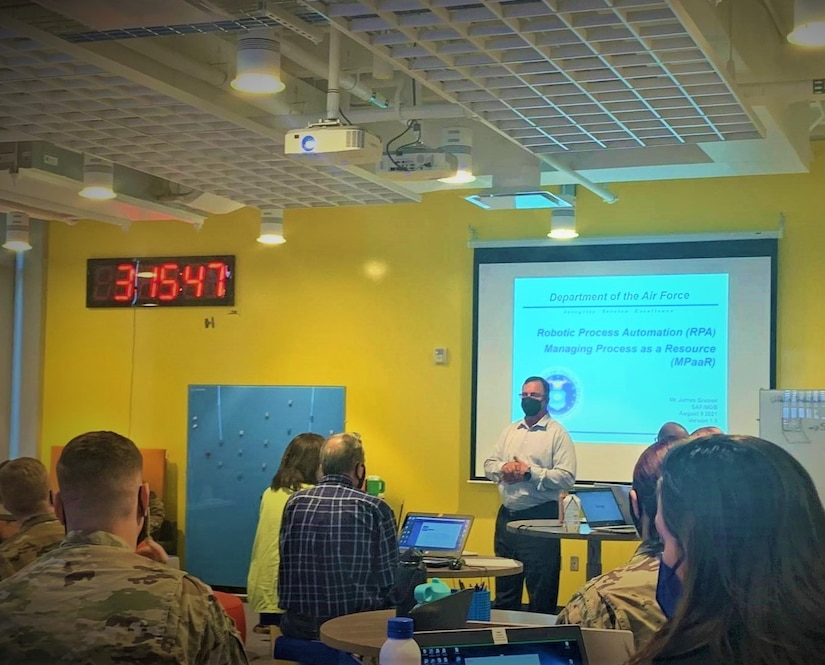U.S. AIR FORCE ACADEMY, Colorado — The Space Force held its first Robotic Process Automation Workshop to explore how to effectively leverage bots to execute repetitive processes, as part of efforts to modernize the world-class fighting force at the speed of relevance. Permanent staff from the U.S. Space Force Space Operations Command, Headquarters U.S. Space Force, Air Force Personnel Center, and Air Force Reserve Personnel Center attended this brief seminar as students to learn how to leverage automation to “delegate away” the repetitive nature of manual tasks.

This class taught students to acknowledge the need to critically assess and identify a higher value process ecosystem to address, not just automate any repetitive process. Furthermore, RPA is all about getting to value up front.
It is important to not only understand the end-to-end process, but also to focus on targeting the desired outcome(s). This instructional training emphasized just-in-time Continuous Improvement and Innovation concepts to “Do the right things. Have a healthy dis-respect for stupid”, says James Grenier, Chief of the Process Management Branch at Air Force SAF/MGB who lectured about ‘Managing Process as a Resource’.
During the week-long workshop, students received a brief immersion into the technology from a mix of both government and commercial automation subject matter experts. In order to accommodate students with previous and varying levels of knowledge of RPA technology and/or programming experience, the class also incorporated breakouts for ideation sessions, Human Centered Design, Orchestrator, and advanced developer topics.
One important aspect of workforce impact is the expansion of students who may previously not have considered RPA. “I don’t have coding experience, and work as a program manager mostly. However, this program has shown me the tools and given me the knowledge that will allow my teams to cut time and create efficiencies,” says Capt Jon Borah, the Combat Development Team Director at Delta 8. “Not only has it given me the tools, but it’s taught me to think about the processes that go into tasks and what can be done to make them more efficient via digital/automation means.”
In fact, RPA is specifically cited by the USSF’s ‘Vision for a Digital Service’ as one important ingredient inside the recipe to establish a digital foundation to minimize the workforce friction from manual processes in the quest to return dwell time back to Guardians, as per the CSO Planning Guidance.
“This technology has the potential to allow us to better focus on our core mission of developing leaders of character by freeing us from the repetitive, boring, and mundane tasks that can easily be completed by machines,” says Col. Richard T. Cooney, Jr, Head of the Department of Behavioral Sciences and Leadership at the United States Air Force Academy. “By smartly allocating tasks to humans and machines, we can leverage technology to better enable humans to perform tasks best performed by people, like developing our future USAF and USSF leaders.”
Indeed, students in the class were able to create functional bots to “bring back” to their regular jobs to save them time immediately. As Jessica Frindt, a Contracting Specialist in 21st Contracting Squadron notes, “My project was to build a bot to upload files to KT File Share. KTFS slows down contracting specialists and is incredibly inefficient to use. I get busy with multiple requirements and it is difficult to keep files updated. This bot will allow me to ensure that all of my files are current and uploaded for review.”


 Copyright 2023 All rights reserved.
Copyright 2023 All rights reserved.